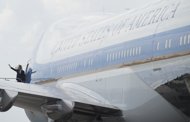Obama lands in Colombia for Americas summit

Air Force One landed around 4:40 pm (2140 GMT) in the resort city of Cartagena on the Caribbean. The US leader was to attend a dinner hosted by Colombian President Juan Manuel Santos ahead of the two-day weekend summit.
Before leaving Washington, Obama made clear in an interview with the Grupo de Diarios America, an association of leading Latin American newspapers, that he rejects the idea of decriminalizing drugs as proposed by some Central American leaders.
On Cuba, he insisted that Havana authorities "have shown no interest in changing their relationship with the United States, nor any willingness to respect the democratic and human rights of the Cuban people."
The twin issues -- the pros and cons of drug legalization and Cuba's continued exclusion from the summit -- were expected to dominate the agenda of the Summit of the Americas, highlighting the growing disconnect between Washington and an increasingly assertive and independent Latin American bloc led by powerhouse Brazil.
All democratically elected leaders of the Western Hemisphere were invited to attend the Cartagena gathering, with the official theme being: "Connecting the Americas: Partners for Prosperity."
US Secretary of State Hillary Clinton, who arrived here earlier Friday, was also to take part in the summit, which kicks off in earnest around 1700 GMT Saturday.
The hemispheric leaders were also to tackle regional integration, reducing poverty and inequality, combating transnational crime and increased access to technology.
But uppermost in their minds will be whether to rethink the fight against drugs, which are creating havoc across the region.
Some Central American leaders led by Guatemalan President Otto Perez Molina, reeling from 20,000 murders linked to cocaine cartels in their region last year, plan to push for drug decriminalization.
"This is a legitimate debate that reflects the frustrations of governments and citizens across the Americas," Obama acknowledged in his interview.
But he said Washington would not "legalize or decriminalize drugs because doing so would have serious negative consequences in all our countries in terms of public health and safety."
He added that legalizing or decriminalizing drugs "would not eliminate the danger posed by transnational organized crime."
The US leader, who is seeking re-election in the November elections and keen not to give ammunition to his right-wing domestic opponents, also stood firm on Cuba, an issue on which he faces virtually total regional isolation.
"History shows that the yearning for human freedom and dignity cannot be denied forever. No authoritarian regime lasts forever," he said in a pointed reference to Cuba's communist rulers.
Cuba has never taken part in a Summit of the Americas. And in early March, Santos traveled to the Cuban capital to explain that a lack of consensus had prevented Cuba from being invited this time.
But Havana's exclusion prompted Ecuador's Rafael Correa to stay away while Bolivian President Evo Morales said on arrival Friday that he was convinced the summit would be "the last without Cuba."
Venezuela's President Hugo Chavez, who is being treated for cancer, said he was heading to Cuba for a new round of radiation therapy Saturday but did not rule out a stop in Cartagena if allowed by his doctors.
Late Thursday, Argentine Foreign Minister Hector Timerman said here that the United States and Canada were now the only countries in the Americas that refuse to invite Cuba to the summit and which do not back Argentina's claim to the British-ruled Falkland Islands in the South Atlantic.
He said he was hopeful of securing from the summit a "new manifestation of solidarity" with Argentina in its dispute with Britain.
Argentina and Britain this month marked 30 years since they went to war over the Falklands, with Argentine President Cristina Kirchner calling British rule over the disputed islands "absurd."
Washington has said it will remain neutral and has recommended a negotiated solution.
Obama was also expected to hear complaints of US neglect of Latin America, which has been buoyed by rapid economic growth and economic integration, and is seeking a more balanced partnership.
But in his interview, Obama countered: "With no other region of the world does the United States have so many connections, shared values, a common heritage, and common interests."
"The Western Hemisphere is especially important to my highest priority, creating jobs and opportunity in the United States," Obama said.
What the stars mean:
★ Poor ★ ★ Promising ★★★ Good ★★★★ Very good ★★★★★ Exceptional
 Tag:
Tag:
Related Contents
Latest News
More News
- Foreign leaders extend congratulations to Party General Secretary To Lam (January 25, 2026 | 10:01)
- Russian President congratulates Vietnamese Party leader during phone talks (January 25, 2026 | 09:58)
- Worldwide congratulations underscore confidence in Vietnam’s 14th Party Congress (January 23, 2026 | 09:02)
- Political parties, organisations, int’l friends send congratulations to 14th National Party Congress (January 22, 2026 | 09:33)
- 14th National Party Congress: Japanese media highlight Vietnam’s growth targets (January 21, 2026 | 09:46)
- 14th National Party Congress: Driving force for Vietnam to continue renewal, innovation, breakthroughs (January 21, 2026 | 09:42)
- Vietnam remains spiritual support for progressive forces: Colombian party leader (January 21, 2026 | 08:00)
- Int'l media provides large coverage of 14th National Party Congress's first working day (January 20, 2026 | 09:09)
- Vietnamese firms win top honours at ASEAN Digital Awards (January 16, 2026 | 16:45)
- ASEAN Digital Ministers' Meeting opens in Hanoi (January 15, 2026 | 15:33)






















 Mobile Version
Mobile Version